Items filtered by date: July 2024
Stretches and Exercises to Relieve Foot Arthritis
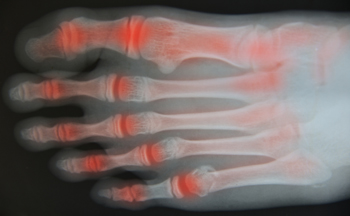
Foot arthritis can be debilitating, but incorporating stretches and exercises into your daily routine can help alleviate pain and improve mobility. Toe curls are where you scrunch a towel with your toes to strengthen the muscles in your feet and promote flexibility. Ankle circles help maintain joint mobility and reduce stiffness. Calf stretches, such as leaning against a wall with one leg extended behind you, help stretch the muscles and tendons in your lower leg, easing strain on arthritic joints. Toe stretches, gently pulling each toe back for a few seconds, can increase flexibility and reduce discomfort. Finally, seated heel raises, lifting your heels off the ground while seated, strengthen the muscles in your calves and feet, providing support to arthritic joints. If you have arthritis in your feet, it is suggested that you are under the care of a podiatrist who can help you to manage this condition.
Arthritis can be a difficult condition to live with. If you are seeking treatment, contact Anas Khoury, DPM from North Eastern Foot & Ankle Specialists. Our doctor can provide the care you need to keep you pain-free and on your feet.
Arthritic Foot Care
Arthritis is a joint disorder that involves the inflammation of different joints in your body, such as those in your feet. Arthritis is often caused by a degenerative joint disease and causes mild to severe pain in all affected areas. In addition to this, swelling and stiffness in the affected joints can also be a common symptom of arthritis.
In many cases, wearing ill-fitting shoes can worsen the effects and pain of arthritis. Wearing shoes that have a lower heel and extra room can help your feet feel more comfortable. In cases of rheumatoid arthritis, the arch in your foot may become problematic. Buying shoes with proper arch support that contour to your feet can help immensely.
Alleviating Arthritic Pain
- Exercises that stretch the foot can prevent further pain and injury and increase mobility
- Most of the pain can be alleviated with anti-inflammatory drugs, heat, and topical medications
- Massages can help temporarily alleviate pain.
It is best to see your doctor for the treatment that is right for your needs and symptoms. Conditions vary, and a podiatrist can help you determine the right method of care for your feet.
If you have any questions, please feel free to contact our office located in Passaic, NJ . We offer the newest diagnostic tools and technology to treat your foot and ankle needs.
Plantar Warts Can Be Treated!
The Wrong Shoe Size Can Cause Foot Problems
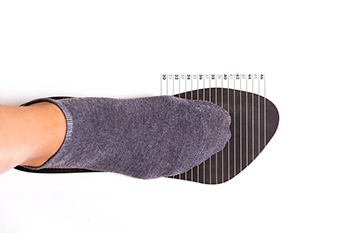
Wearing shoes that are too big or too small can lead to various foot problems. Tight shoes can cause blisters, bunions, and calluses due to constant friction and pressure. On the other hand, shoes that are too loose can result in foot instability, increasing the risk of sprains and strains. To find the right shoe size, measure your feet at the end of the day when they are most swollen. Ensure there is enough room in the toe box for your toes to move freely, and the shoe should fit snugly around the heel without slipping. Trying on shoes with the type of socks you plan to wear with them can also help achieve a proper fit. If you have developed foot conditions from wearing the wrong size shoes, it is suggested that you speak to a podiatrist who can treat various foot ailments and provide education for proper foot measurement.
It is important to find shoes that fit you properly in order to avoid a variety of different foot problems. For more information about treatment, contact Anas Khoury, DPM from North Eastern Foot & Ankle Specialists. Our doctor will treat your foot and ankle needs.
Proper Shoe Fitting
Shoes have many different functions. They cushion our body weight, protect our feet, and allow us to safely play sports. You should always make sure that the shoes you wear fit you properly in order to avoid injuries and deformities such as: bunions, corns, calluses, hammertoes, plantar fasciitis, stress fractures, and more. It is important to note that although a certain pair of shoes might be a great fit for someone else, that doesn’t mean they will be a great fit for you. This is why you should always try on shoes before buying them to make sure they are worth the investment. Typically, shoes need to be replaced ever six months to one year of regular use.
Tips for Proper Shoe Fitting
- Select a shoe that is shaped like your foot
- Don’t buy shoes that fit too tight, expecting them to stretch to fit
- Make sure there is enough space (3/8” to ½”) for your longest toe at the end of each shoe when you are standing up
- Walk in the shoes to make sure they fit and feel right
- Don’t select shoes by the size marked inside the shoe, but by how the shoe fits your foot
The shoes you buy should always feel as good as they look. Shoes that fit properly will last longer, feel better, and improve your way of life each day.
If you have any questions, please feel free to contact our office located in Passaic, NJ . We offer the newest diagnostic and treatment technologies for all your foot care needs.
Custom Orthotics Can Be Used In Stylish Footwear

Who said style can't be comfortable? With Custom Orthotics, you get the best of both worlds. Slip them into your favorite fashionable shoes and feel the difference. They mold to your feet, offering support without compromising on style. No more choosing between looking good and feeling great. With Custom Orthotics, step out in style and comfort every day. Contact our office to learn more!
Facts About Plantar Fasciitis and Its Symptoms
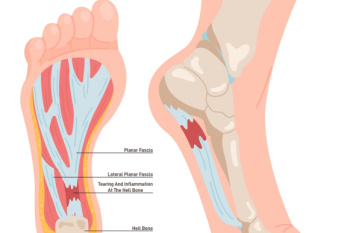
Plantar fasciitis is a common cause of heel pain, resulting from inflammation of the plantar fascia, which is the thick band of tissue that runs along the bottom of the foot and connects the heel bone to the toes. The condition typically causes a sharp, stabbing pain in the heel, particularly noticeable with the first steps in the morning or after periods of inactivity. Risk factors include prolonged standing, high-impact activities, obesity, and wearing unsupportive shoes. The pain usually lessens with movement but can return after long periods of standing or sitting. Treatment often involves stretching exercises, wearing proper footwear, and rest to reduce inflammation. In severe cases, orthotics or injections may be necessary. Plantar fasciitis can cause severe pain and can hinder completing daily activities. If you have heel pain, it is strongly suggested that you are under the care of a podiatrist who can accurately diagnose and treat plantar fasciitis.
Plantar fasciitis can be very painful and inconvenient. If you are experiencing heel pain or symptoms of plantar fasciitis, contact Anas Khoury, DPM from North Eastern Foot & Ankle Specialists. Our doctor can provide the care you need to keep you pain-free and on your feet.
What Is Plantar Fasciitis?
Plantar fasciitis is the inflammation of the thick band of tissue that runs along the bottom of your foot, known as the plantar fascia, and causes mild to severe heel pain.
What Causes Plantar Fasciitis?
- Excessive running
- Non-supportive shoes
- Overpronation
- Repeated stretching and tearing of the plantar fascia
How Can It Be Treated?
- Conservative measures – anti-inflammatories, ice packs, stretching exercises, physical therapy, orthotic devices
- Shockwave therapy – sound waves are sent to the affected area to facilitate healing and are usually used for chronic cases of plantar fasciitis
- Surgery – usually only used as a last resort when all else fails. The plantar fascia can be surgically detached from the heel
While very treatable, plantar fasciitis is definitely not something that should be ignored. Especially in severe cases, speaking to your doctor right away is highly recommended to avoid complications and severe heel pain. Your podiatrist can work with you to provide the appropriate treatment options tailored to your condition.
If you have any questions please feel free to contact our office located in Passaic, NJ . We offer the newest diagnostic and treatment technologies for all your foot and ankle needs.
Foot Conditions That Warrant Wearing Orthotics
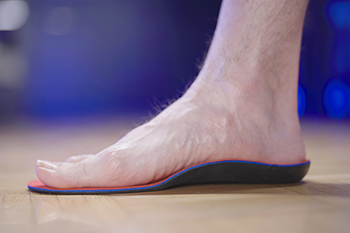
Orthotics are shoe inserts that can be beneficial for various foot conditions affecting mobility and comfort. One common condition is plantar fasciitis, where orthotics provide essential arch support to alleviate heel pain. Flat feet, or fallen arches, often require orthotics to improve alignment and reduce strain on the feet and legs. People with arthritis can benefit from orthotics, as they help cushion the joints and distribute weight evenly, reducing pain and inflammation. Bunions, which cause pain at the base of the big toe, can be managed with orthotics that ease pressure and improve foot function. Additionally, orthotics are often prescribed for those with diabetes, offering protection and preventing complications like ulcers. Athletes frequently use orthotics to enhance performance, prevent injuries, and support recovery. If you are interested in learning about how orthotics can benefit your specific foot condition, it is suggested that you consult a podiatrist.
If you are experiencing discomfort in your feet and would like to try custom orthotics, contact Anas Khoury, DPM from North Eastern Foot & Ankle Specialists. Our doctor can provide the care you need to keep you pain-free and on your feet.
What Are Custom Orthotics?
Custom orthotics are inserts you can place into your shoes to help with a variety of foot problems such as flat feet or foot pain. Orthotics provide relief and comfort for minor foot and heel pain.
Over-the-Counter Inserts
Shoe inserts come in a wide variety and are used to treat foot pain, heel pain, and minor problems. For example, arch supports can be inserted into your shoes to help correct overarched or flat feet, while gel insoles are often used because they provide comfort and relief from foot and heel pain by alleviating pressure.
Prescription Orthotics
If over-the-counter inserts don’t work for you or if you have a more severe foot concern, it is possible to have your podiatrist prescribe custom orthotics. These high-quality, custom inserts are designed to treat problems such as abnormal motion, plantar fasciitis, and severe forms of heel pain. They can even be used to help patients suffering from diabetes by treating foot ulcers and painful calluses and are usually molded to your feet individually, which allows them to provide full support and comfort.
If you're experiencing minor to severe foot or heel pain, it’s recommended to speak with your podiatrist about the possibility of using custom orthotics or shoe inserts. A podiatrist can determine which type of custom orthotic or shoe insert is right for you and help you take the first steps toward being pain-free.
If you have any questions please contact our office located in Passaic, NJ . We offer the newest diagnostic and treatment technologies for all your foot and ankle needs.
Understanding the Causes of Bunion Pain
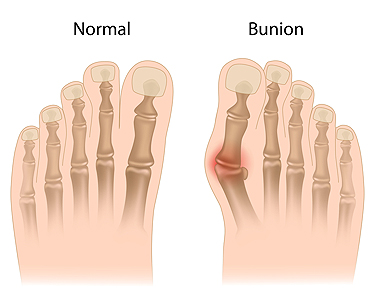 Bunion pain arises when a bony bump forms on the joint at the base of the big toe. This condition, known as a bunion, occurs due to prolonged pressure on the foot, often from wearing tight or ill-fitting shoes. The pressure causes the big toe to lean towards the second toe, resulting in the joint jutting out and becoming inflamed. This inflammation leads to pain, swelling, and redness. Genetics also plays a role, as bunions can run in families. Additionally, certain foot shapes and conditions, such as flat feet or arthritis, increase the likelihood of developing bunions. The pain can be worsened by activities that put extra stress on the feet, such as standing for long periods or engaging in high-impact sports. Proper footwear, orthotics, and, in severe cases, surgery can help alleviate bunion pain. If you have a bunion that is causing you pain and discomfort, it is suggested that you confer with a podiatrist who can determine the best course of treatment for you.
Bunion pain arises when a bony bump forms on the joint at the base of the big toe. This condition, known as a bunion, occurs due to prolonged pressure on the foot, often from wearing tight or ill-fitting shoes. The pressure causes the big toe to lean towards the second toe, resulting in the joint jutting out and becoming inflamed. This inflammation leads to pain, swelling, and redness. Genetics also plays a role, as bunions can run in families. Additionally, certain foot shapes and conditions, such as flat feet or arthritis, increase the likelihood of developing bunions. The pain can be worsened by activities that put extra stress on the feet, such as standing for long periods or engaging in high-impact sports. Proper footwear, orthotics, and, in severe cases, surgery can help alleviate bunion pain. If you have a bunion that is causing you pain and discomfort, it is suggested that you confer with a podiatrist who can determine the best course of treatment for you.
If you are suffering from bunions, contact Anas Khoury, DPM of North Eastern Foot & Ankle Specialists. Our doctor can provide the care you need to keep you pain-free and on your feet.
What Is a Bunion?
A bunion is formed of swollen tissue or an enlargement of boney growth, usually located at the base joint of the toe that connects to the foot. The swelling occurs due to the bones in the big toe shifting inward, which impacts the other toes of the foot. This causes the area around the base of the big toe to become inflamed and painful.
Why Do Bunions Form?
Genetics – Susceptibility to bunions are often hereditary
Stress on the feet – Poorly fitted and uncomfortable footwear that places stress on feet, such as heels, can worsen existing bunions
How Are Bunions Diagnosed?
Doctors often perform two tests – blood tests and x-rays – when trying to diagnose bunions, especially in the early stages of development. Blood tests help determine if the foot pain is being caused by something else, such as arthritis, while x-rays provide a clear picture of your bone structure to your doctor.
How Are Bunions Treated?
- Refrain from wearing heels or similar shoes that cause discomfort
- Select wider shoes that can provide more comfort and reduce pain
- Anti-inflammatory and pain management drugs
- Orthotics or foot inserts
- Surgery
If you have any questions, please feel free to contact our office located in Passaic, NJ . We offer the newest diagnostic and treatment technologies for all your foot care needs.
Preventing Plantar Warts in Children
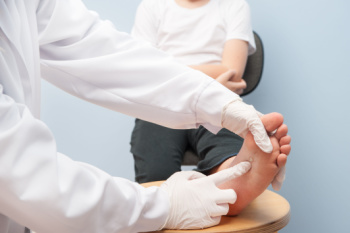
Plantar warts are a common issue in children, caused by the human papillomavirus, or HPV. These warts typically appear on the soles of the feet, causing discomfort and sometimes pain. The virus thrives in warm, moist environments, making public swimming pools, locker rooms, and communal showers common sources of infection. To prevent plantar warts, encourage children to wear protective footwear in these areas. Regularly washing feet and keeping them dry can also reduce the risk. It is important to avoid sharing shoes, socks, or towels to prevent the spread of the virus. If a child already has a plantar wart, covering it with a bandage can help prevent transmission. Promptly treating warts can also minimize discomfort and prevent them from spreading to others. Teaching children these habits can help protect them from plantar warts. If your child has developed a plantar wart, it is suggested that you visit a podiatrist who can properly treat this condition.
Plantar warts can be very uncomfortable. If you need your feet checked, contact Anas Khoury, DPM from North Eastern Foot & Ankle Specialists. Our doctor will assist you with all of your foot and ankle needs.
About Plantar Warts
Plantar warts are the result of HPV, or human papillomavirus, getting into open wounds on the feet. They are mostly found on the heels or balls of the feet.
While plantar warts are generally harmless, those experiencing excessive pain or those suffering from diabetes or a compromised immune system require immediate medical care. Plantar warts are easily diagnosed, usually through scraping off a bit of rough skin or by getting a biopsy.
Symptoms
- Lesions on the bottom of your feet, usually rough and grainy
- Hard or thick callused spots
- Wart seeds, which are small clotted blood vessels that look like little black spots
- Pain, discomfort, or tenderness of your feet when walking or standing
Treatment
- Freezing
- Electric tool removal
- Laser Treatment
- Topical Creams (prescription only)
- Over-the-counter medications
To help prevent developing plantar warts, avoid walking barefoot over abrasive surfaces that can cause cuts or wounds for HPV to get into. Avoiding direct contact with other warts, as well as not picking or rubbing existing warts, can help prevent the further spread of plantar warts. However, if you think you have developed plantar warts, speak to your podiatrist. He or she can diagnose the warts on your feet and recommend the appropriate treatment options.
If you have any questions please feel free to contact our office located in Passaic, NJ . We offer the newest diagnostic and treatment technologies for all your foot and ankle needs.

